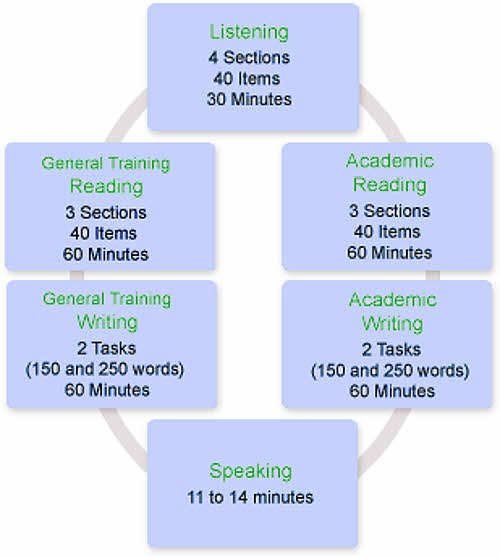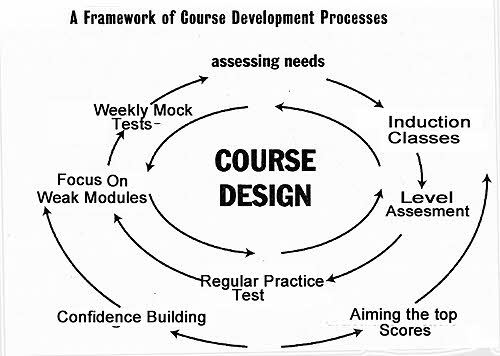- What is IELTS?
- Why choose IELTS?
- IELTS characteristics
- About IELTS
- Test format
- Academic or General Training?
- Academic Version
- General Training Version
- Who accepts IELTS?
- Bands
- Teaching methodology
- How Asppen Overseas prepares you:
- Locations and test dates
- Benefits of IELTS
What is IELTS?
IELTS, the International English Language Testing System, is designed to assess the language ability of candidates who need to study or work where English is the language of communication. The International English Language Testing System (IELTS) is the world’s most popular high-stakes English language proficiency test for higher education and global migration, with more than 2 million tests taken in the last year.

IELTS is jointly managed by the University of Cambridge ESOL Examinations (Cambridge ESOL), British Council and IDP: IELTS Australia. IELTS conforms to the highest international standards of language assessment. IELTS is recognized by universities and employers in many countries, including Australia, Canada, New Zealand, the UK and the USA. It is also recognized by professional bodies, immigration authorities and other government agencies. IELTS assesses all of your English skills — reading, writing, listening and speaking — and is designed to reflect real life use of English — at study, at work, and at play.
The IELTS test is developed by some of the world’s leading experts in language assessment. It has an excellent international reputation, and is accepted by over 8,000 organizations worldwide, including schools, universities, employers, immigration authorities and professional bodies. IELTS is the most widely accepted English language test that uses a one-on-one speaking test to assess your English communication skills. This means that you are assessed by having a real-life conversation with a real person. This is the most effective and natural way of testing your English conversation skills. Most universities in the UK, Australia, New Zealand, the USA and Canada accept it. IELTS is also required as a proof of your language abilities for immigration to Australia, New Zealand, Canada and the United Kingdom. The test is taken by over a million people in over 120 countries worldwide every year.
You can choose from two versions of the test – IELTS Academic or IELTS General Training – depending on the organization you are applying to and your plans for the future. Both versions of the test are made up of four parts – Listening, Reading, Writing and Speaking. IELTS results are graded on the unique IELTS 9-band scale.

Why choose IELTS?
IELTS scores are accepted by over 8,000 organizations worldwide, including universities, employers, immigration authorities and professional bodies. IELTS is designed by experts to fairly assess the language ability of candidates who want to study or work where English is the language of communication.
International English
IELTS recognizes both British and American English in terms of spelling, grammar and choice of words. It also incorporates a mix of native speaker accents from Australia, Canada, New Zealand, the UK and US in the Listening component.
International content
The IELTS approach is recognized as being fair, reliable and valid to all candidates, whatever their nationality, cultural background, gender or special needs. A network known as the IELTS item writers in Australia, Canada, New Zealand, UK and the US develops the test questions. They are based on real life sources (for example, advertisements, books, newspapers and company policies), so ensuring that they are always fit for purpose.

International consultation
IELTS has been developed in close consultation with academics, professional bodies and immigration authorities from around the world.
International partners
IELTS is owned by a global partnership of education and language experts: the British Council, IDP: IELTS Australia and the Cambridge English Language Assessment. These bodies are dedicated to academic excellence, cultural understanding, student recruitment and creating success worldwide.
Choose from more than 900 locations worldwide
IELTS tests are offered up to four times a month in over 900 test venues in more than 130 countries. The cost of taking the test is set locally and payable in the local currency, making registration convenient. Results are issued 13 calendar days after the test. Official IELTS test centers can send Test Report Forms directly to your organization or institution (provided it has been nominated), either by mail or as an electronic download.
IELTS characteristics
The IELTS incorporates the following features:
- A variety of accents and writing styles have been presented in test materials in order to minimize linguistic bias.
- IELTS tests the ability to listen, read, write and speak in English.
- Band scores are used for each language sub-skill (Listening, Reading, Writing, and Speaking). The Band Scale ranges from 0 (“Did not attempt the test”) to 9 (“Expert User”).
- The speaking module is a key component of IELTS. It is conducted in the form of a one-to-one interview with an examiner. The examiner assesses the candidate as he or she is speaking, but the speaking session is also recorded for monitoring as well as re-marking in case of an appeal against the banding given.
- IELTS is developed with input from item writers from around the world. Teams are located in the USA, Great Britain, Australia, New Zealand, Canada and other English-speaking nations.
About IELTS
The International English Language Testing System (IELTS) is a test of English Language proficiency of non-native English speakers. The test scores are a pre-requisite for getting admission in UK, Australian, New Zealand and Canadian colleges and universities. Of late American universities too have started accepting IELTS scores. This test is an important step forward for those seeking to study or work in a foreign country.

IELTS – a history of innovation
The forerunner to IELTS was the English Language Testing Service (ELTS) introduced in 1980. The test had an innovative format that reflected changes in language learning and teaching theory and developments in language testing. In particular, the ELTS was influenced by the growth in ‘communicative’ language learning and ‘English for specific purposes’. Test tasks were based on an analysis of the ways in which language was used in academic contexts and were intended to reflect the use of language in the ‘real world’.
Ongoing research and development by the British Council and UCLES EFL (now known as Cambridge English Language Assessment) led to a revised testing system and broader international participation with the involvement of the International Development Program of Australian Universities and Colleges (IDP), now known as IDP Education Australia. IDP, British Council and UCLES formed an international partnership, reflected in the new name for the test: The International English Language Testing System.
IELTS 1989 – 20 years of setting the standard
The International English Language Testing System (IELTS) first became operational in 1989. From 1989 IELTS candidates took two non-specialized modules, Listening and Speaking, and two specialized modules, Reading and Writing.
Further modifications to the test were implemented in April 1995. In keeping with this history of innovation, the IELTS partners continue to be committed to the ongoing development of the test. A revised IELTS Speaking Test was introduced in July 2001. New assessment criteria for the Writing Test were operational from January 2005. A computerized version of IELTS was also introduced in 2005 at a number of IELTS centers. Information on all these projects can be found in past issues of the IELTS Annual Review, and in Cambridge English Language Assessment’s quarterly publication – Research Notes.
The current test retains many of the features of the 1980 ELTS including the emphasis on the comprehension of extended text in the receptive papers (Reading and Listening), and the direct testing of performance through a face-to-face Speaking test and the use of the essay and report formats in the Writing test.
Test formats

You have a choice of two versions of IELTS: Academic or General Training.
The Academic Version is intended for those who want to enroll in universities and other institutions of higher education and for professionals such as medical doctors and nurses who want to study or practice in an English-speaking country.
The General Training Version is intended for those planning to undertake non-academic training or to gain work experience, or for immigration purposes. The General Training is suitable for candidates who are going abroad for immigration or training purposes (other than degree level), whereas, the Academic Reading and Writing modules are selected by candidates who wish to study at an undergraduate or postgraduate level. Everybody takes the same ‘Listening’ and ‘Speaking’ components. It is the ‘Reading’ and ‘Writing’ components that differ.
You will take the Listening, Reading and Writing tests all on the same day one after the other, with no breaks in between them. They are always taken in this order.
Your Speaking test will either be after a break on the same day as the other three tests, or up to seven days before or after that. This will depend on your test centre.
Academic or General Training?
There are two versions of IELTS to choose from:
- IELTS Academic
- IELTS General Training
IELTS Academic – Institutions of Higher and Further Education
The Academic format is, broadly speaking, for those who want to study or train in an English-speaking university or Institutions of Higher and Further Education. Admission to undergraduate and postgraduate courses is based on the results of the Academic test. IELTS Academic may also be a requirement to join a professional organization in an English-speaking country.
General Training – for school, work or migration
The General Training format focuses on general survival skills in broad social and workplace contexts. It is typically for those who are going to English-speaking countries to do secondary education, work experience or training programs. People migrating to Australia, Canada and New Zealand must sit the General Training test.
IELTS test time:
Listening – 30 minutes (4 sections, 40 questions) and additional 10 minutes for transferring answers onto the OMR answer sheet.
Reading – 60 minutes (3 sections, 40 questions)
Writing – 60 minutes (2 tasks of 150 + 250 words)
Speaking – 11 to 14 minutes
Total test time – 2 hrs 45minutes.
On the day of the test, the four subsections will be taken in the following order:

IELTS listening test consists of four sections, played on cassette tape. Each section might be a dialogue or a monologue. The test is played once only, and the questions for each section must be answered while listening. The module comprises four sections of increasing difficulty. It takes 40 minutes: 30 – for testing, plus 10 minutes at the end for transferring the answers to an answer sheet. Each section begins with a short introduction telling the candidates about the situation and the speakers. Then they have some time to look through the questions. The first three sections have a break in the middle allowing candidates to look at the remaining questions. Each section is heard only once.
IELTS Reading test lasts for 60 minutes. Students are given an Academic Reading test, or a General Training Reading test. Both tests consist of three sections, and in both tests the sections are in order of increasing difficulty. In the academic module the reading test comprises three sections, with 3 texts normally followed by 13 or 14 questions for a total of 40 questions overall. The General test also has 3 sections. However the texts are shorter, so there can be up to 5 texts to read.
IELTS Writing test also lasts for 60 minutes. Again, students take either an Academic test, or a General Training test. Students must perform two writing tasks, which require different styles of writing. There is no choice of question topics. In Task 1 candidates describe a diagram, graph, process or chart, and in Task 2 they respond to an argument. In the General Training module, there are also two tasks: in Task 1 candidates write a letter or explain a situation, and in Task 2 they write an essay.
IELTS Speaking test consists of a one-to-one interview with a specially trained examiner. The examiner will lead the candidate through the three parts of the test:
An introduction and interview, an individual long turn where the candidate speaks for one or two minutes on a particular topic, and a two-way discussion thematically linked to the individual long turn. This interview will last for approximately 11-14 minutes. In the first section candidates may be asked about their hobbies, interests, reasons for taking IELTS exam as well as other general topics such as clothing, free time, computers and the internet or family. In the second section candidates are given a topic card and then they have one minute to prepare after which they must speak about the given topic. The third section involves a discussion between the examiner and the candidate, generally on questions relating to the theme, which they have already spoken about in part 2. This last section is more abstract, and is usually considered the most difficult.
IELTS Academic
The Academic version includes three long texts, which range from the descriptive and factual to the discursive and analytical. The texts are authentic and are taken from books, journals, magazines and newspapers. These have been selected for a non-specialist audience but are appropriate for candidates entering university courses or seeking professional registration.
This test is for those who plan to study English in a university to test their understanding and use of complex academic language. IELTS Academic is divided into four sections.
Listening
The test is of 30 minutes and 10 minutes are given extra for transferring answers to the answer sheet. The candidates are tested on monologues and conversations.
Reading
The test is of 60 minutes in which students are tested on reading passages with tasks, text from descriptive and factual to discursive and analytical, diagrams, graph, text from books, journals, and newspapers.
Writing
The test is of 60 minutes, which comprises of writing task of 150 words, describing tables, graphs, charts, diagrams and a short essay of 250 words.
The Writing component of IELTS Academic includes two tasks. Topics are of general interest to, and suitable for candidates entering undergraduate and postgraduate studies or seeking professional registration.
Task 1: You will be presented with a graph, table, chart or diagram and asked to describe, summarize or explain the information in your own words. You may be asked to describe and explain data, describe the stages of a process, how something works or describes an object or event.
Task 2: You will be asked to write an essay in response to a point of view, argument or problem. Responses to both tasks must be in a formal style.
Speaking
Speaking test is of 11 to 14 minutes. In this test, candidates are put through face-to-face interview, short questions, speaking on a familiar topic and a discussion.
IELTS General Training
The General Training version requires candidates to read extracts from books, magazines, newspapers, notices, advertisements, company handbooks and guidelines. These are materials you are likely to encounter on a daily basis in an English-speaking environment.
This test is meant for those who require a more general level of English for college, high school, employment or immigration purposes. IELTS General Training is also divided into four sections.
Listening
The test is of 30 minutes and 10 minutes are given extra for transferring answers to the answer sheet. The candidates are tested on monologues and conversations.
Reading
The duration of this test is 60 minutes in which three reading passages with tasks will be given.
Section 1 will be based on two or three short factual texts.
Section 2 will be based on two short factual texts.
Section 3 will be based on one long text on general topic.
(The extracts will be authentic, as it will be taken from books, newspaper etc.)
Writing
Writing section will be of 60 minutes in which candidates will be asked to write a letter of 150 words and short essay of 250 words.
The Writing component of IELTS General Training includes two tasks, which are based on topics of general interest.
Task 1: You will be presented with a situation and asked to write a letter requesting information, or explaining the situation. The letter may be personal, semi-formal or formal in style.
Task 2: You will be asked to write an essay in response to a point of view, argument or problem. The essay can be slightly more personal in style than the Academic Writing Task 2 essay.
Speaking
Speaking test is of 11 to 14 minutes. In this test, candidates are put through face-to-face interview, short questions, speaking on a familiar topic and a discussion.

Listening
30 minutes
You will listen to four recorded texts, monologues and conversations by a range of native speakers, and write your answers to a series of questions. These include questions, which test your ability to understand main ideas and detailed factual information, ability to understand the opinions and attitudes of speakers, ability to understand the purpose of an utterance and the ability to follow the development of ideas. A variety of voices and native-speaker accents are used and each section is heard only once.
Section 1: A conversation between two people set in an everyday social context.
Section 2: A monologue set in an everyday social context e.g. a speech about local facilities.
Section 3: A conversation between up to four people set in an educational or training context, e.g. a university tutor and a student discussing an assignment.
Section 4: A monologue on an academic subject e.g. a university lecture.

Speaking
The Speaking component assesses your use of spoken English, and takes between 11 and 14 minutes to complete. Every test is recorded. The Speaking component is delivered in such a way that it does not allow candidates to rehearse set responses beforehand.
Part 1: The Examiner will ask you general questions about yourself and a range of familiar topics, such as home, family, work, studies and interests. This part lasts between four and five minutes.
Part 2: You will be given a card, which asks you to talk about a particular topic. You will have one minute to prepare before speaking for up to two minutes. The examiner will then ask one or two questions on the same topic to finish this part of the test.
Part 3: You will be asked further questions connected to the topic in Part 2. These questions will give you the opportunity to discuss more abstract ideas and issue. The part of the test lasts between four and five minutes.

IELTS scoring
The IELTS nine (9) band score system grades scores consistently. It is secure, benchmarked and understood worldwide. Test materials are designed carefully so that every version of the test is of a comparable level of difficulty.
IELTS Examiners
IELTS Examiners are fully qualified and follow the specific IELTS assessment standards around the world. IELTS has a quality-controlled system of recruitment, training, benchmarking, certification and monitoring. IELTS markers are regularly monitored and tested every two years to retain their certification.
Test delivery
Our test centers are managed by the British Council, IDP: IELTS Australia or by independent organizations that meet strict standards of quality, security and customer service. These centers have strict protocols for all aspects of test design, delivery, marking and administration.
Who accepts IELTS?
IELTS is the world’s proven test. Due to its high quality controls, IELTS is accepted by more than 8,000 organizations in over 135 countries.
- Universities, schools, training colleges, tertiary institutes
- Government departments and agencies
- Professional and industry bodies
- Multinational companies and employers
The proven test with ongoing innovation
IELTS is at the cutting edge of English language testing. The effectiveness of IELTS has been proven since 1989. IELTS test design has continued to incorporate advances in applied linguistics, language pedagogy, language assessment and technology.
Through decades of progressive change, IELTS has remained committed to assessing all four-language skills (reading, writing, listening and speaking) with a face-to-face speaking component. This continues to set IELTS apart from other English language tests.
Ongoing research and development
International teams of writers contribute to IELTS test materials. Ongoing research ensures that IELTS remains fair and unbiased – wherever and whenever the test is taken – and that IELTS encourages, reflects and respects international diversity and is fair to anyone who sits the test, regardless of nationality, background, gender or lifestyle.
The rigorous processes used to produce the test materials ensure that every version of the test is of a comparable level of difficulty, so that candidates’ results are consistent wherever and whenever they take the test. These and the other benefits of IELTS today build on our history of English language testing over many decades.
Education institutions
Educational institutions to assess language ability for courses that are delivered in English use IELTS.
Educational institutions in many countries rely on IELTS, including top universities in Australia, New Zealand, the United Kingdom, the USA and Canada. Universities and tertiary institutions use IELTS Academic for their entry requirements. Schools, colleges and some vocational institutions use IELTS General Training for their entry requirements.
IELTS Bands
There is no pass or fail in IELTS. Candidates are graded on their performance, using scores from 1 to 9 for each part of the test – Listening, Reading, Writing and Speaking. The results from the four parts then produce an Overall Band Score.
This unique 9-band system measures scores in a consistent manner – wherever and whenever the test is taken. It is internationally recognized and understood, giving you a reliable international currency. IELTS scores have a recommended validity period of two years.
The IELTS 9-band scale
Each band corresponds to a level of English competence. All parts of the test and the Overall Band Score can be reported in whole and half bands, e.g. 6.5, 7.0, 7.5, 8.0.

Band 9: Expert user: has fully operational command of the language: appropriate, accurate and fluent with complete understanding.
Band 8: Very good user: has fully operational command of the language with only occasional unsystematic inaccuracies and inappropriacies. Misunderstandings may occur in unfamiliar situations. Handles complex detailed argumentation well
Band 7: Good user: has operational command of the language, though with occasional inaccuracies, inappropriacies and misunderstandings in some situations. Generally handles complex language well and understands detailed reasoning.
Band 6: Competent user: has generally effective command of the language despite some inaccuracies, inappropriacies and misunderstandings. Can use and understand fairly complex language, particularly in familiar situations.
Band 5: Modest user: has partial command of the language, coping with overall meaning in most situations, though is likely to make many mistakes. Should be able to handle basic communication in own field.
Band 4: Limited user: basic competence is limited to familiar situations. Has a frequent problem in understanding and expression. Is not able to use complex language
Band 3: Extremely limited user: conveys and understands only general meaning in very familiar situations. Frequent breakdowns in communication occur.
Band 2: Intermittent user: no real communication is possible except for the most basic information using isolated words or short formulae in familiar situations and to meet immediate needs. Has great difficulty understanding spoken and written English.
Band 1: Non-user: essentially has no ability to use the language beyond possibly a few isolated words.
Band 0: Did not attempt the test: No assessable information provided.
Conversion table
This table can be used for the Listening tests to convert raw scores to band scores. This chart is a guide only, because sometimes the scores adjust slightly depending on how difficult the exam is.
|
Band Score |
9.0 |
8.5 |
8.0 |
7.5 |
7.0 |
6.5 |
6.0 |
5.5 |
5.0 |
4.5 |
4.0 |
3.5 |
3.0 |
2.5 |
|
Raw score |
39 – 40 |
37 – 38 |
35 – 36 |
32 – 34 |
30 – 31 |
26 – 29 |
23 – 25 |
18 – 22 |
16 – 17 |
13 – 15 |
10 – 12 |
8 – 9 |
6 – 7 |
4 – 5 |
Taking IELTS opens doors – it can help you live, study and work around the world. More than 8,000 organizations worldwide accept IELTS, including Government, academic and employment institutions. In fact, IELTS is the only English language test accepted for immigration purposes by all countries that require one.

Text
Teaching methodology: –
Personalized coaching:
The faculties individually attend every student and guidance is provided as per his caliber. Weak students are provided with more of extra lectures and practice tests.
Special grammar session:
Grammar sessions are conducted on the daily basis where in major focus is laid on technicalities of English language like tenses, sentence structure, punctuations, articles, active –passive, direct- indirect, vocabulary, proverbs and idioms etc.
Regular mock test:
Every Saturday of the week is an “acid test” day for the students. Like final IELTS exam, we have set of test papers, which students solve on this day. Results are dispatched via sms and e-mails. Students get to check their performance as they receive the answer sheets after the lecture on a scheduled day.
Standardized material:
We have the latest and the best material for IELTS grammar with ample amount of referral material. We update our study material every month so that students can be benefitted with the most recent and updated material.
Carry home study material:
We provide enormous amount of carry home study material comprising of soft copies and hard copies the material is prepared after a lot of research simultaneously keeping in mind about the study interest of students.
Group discussions and presentations:
We have a separate conference room for students where current topics related to politics, sports, entertainment, social issues, education, current affairs, etc are discussed in the class via GD, presentations and debate where students gets the opportunity to open with others.
Projector training and video lectures:
Different techniques for solving the module, tips, cue cards, essay topics, vocabulary and graph writing are taught on big screen using projector.
Motivational session:
Students are motivated through various videos, documentaries and movies. Motivational games and other activities are conducted in the class to keep students enthusiastic and also to make favorable learning environment.
Our tools:
We use all the latest tools such as LCD projector, headphones, special sound recorders for speaking practice, CCTV recording and along with these gadgets we have English newspapers and magazines to make the students interested in course content and preparation.
Our Faculties:
All of our faculties are carefully screened and scrutinized before assessing their teaching experience, professional knowledge and their ability to effectively communicate with our student population. Our IELTS faculties are professionally trained, highly qualified and experienced with the expertise in competitive exams. Our experienced faculties are experts in their fields and are available the entire day to assist students with any questions or concerns they have.
They impart training through various innovative techniques like group discussion, debates, and elocution interviews, extempore, which make the learning easy. Our faculties are passionate and enthusiastic for teaching and keep the classroom environment lively with friendly interaction with the students.
The important seminars, meetings and presentations conducted by the examination authorities i.e. IDP, British Council are been attended by our faculties time to time and thus we are directly informed by the authorities for new updates.

We emphasize on:
- Induction Class on IELTS
- Daily practice of all four modules
- Important Tips necessary for writing IELTS tests
- Weekly mock tests for self assessment
- Special stress on speaking skills
- Special attention on writing skills and use of Vocabulary
- Use of latest study resources
- Special arrangement of equipments for listening sessions
- Daily interviews conducted for speaking sessions
Our Focus:
Since IELTS test is indispensible to get through, for overseas education, our faculty is completely dedicated towards preparing the students for their test, having an eye on the highest band score, with our efforts 100 percent, we expect the sincere devotion and dedication of students during coaching classes.

How Asppen Overseas prepares you:
Listening and Reading:
We provide you a new Listening and Reading Test to attempt daily in the class. The papers are discussed in detail by our senior and expert faculty and all doubts and incorrect attempts are explained to you the very same day. Your scores are monitored on a daily basis and tips and strategies are provided everyday on how to improve your scores.
Writing:
Writing topics are given to you every day and the students can either attempt these at home, and submit it the next day for correction and feedback, or can even attempt these during class hours. Extensive Study Material is provided for the Writing Section, which consists of Expected Topics and their solved answers for a 9 Band.
Speaking:
We prepare you for a number of topics and assure you that the topic you get during your exam would be out of the ones, which we have prepared you on. Extensive practice is given to students through mock individual sessions.

Tips for improving English for IELTS
– Familiarize yourself with the Test Format
– Improve your skills with practice tests
– Use your English language skills everyday
– Enroll for an IELTS preparatory course
“Individual commitment to a group effort is what makes a team and company work”
Our only aim is to provide our students with quality coaching techniques. Quality is never sacrificed for profitability at Asppen. Our teachers are the best you can find anywhere with intensive teaching experience.
Asppen is the way to go in order to improve your English skills as our team is enthusiastic and passionate about training. Our lessons provide plenty of opportunities for students to use language and build their knowledge and confidence in English by participating in various activities such as group discussions, confidence-building activities both inside and outside the classrooms. At Asppen each individual is fully committed to our goal- to help YOU achieve your dreams. We, as an organization believe in empowering our students to be at their best, no matter what the challenges are.
We acknowledge that we are entirely responsible for Asppen reputation, and that the level of success we achieve, the reputation we cultivate, and the contributions we make are a direct reflection not only of the company, but also of ourselves. By adhering to these standards, we guarantee our Coaching will be Fun and Exceptional.
IELTS is accepted by most Australian, British, Canadian, Irish, New Zealand and South African academic institutions, over 3,000 academic institutions in the United States, and various professional organizations. It is also a requirement for immigration to Australia, New Zealand and Canada.
No minimum score is required to pass the test. An IELTS result or Test Report Form is issued to all candidates with a score from “band 1” (“non-user”) to “band 9” (“expert user”) and each institution sets a different threshold. There is also a “band 0” score for those who did not attempt the test. Institutions are advised not to consider a report older than two years to be valid, unless the user proves that he has worked to maintain his level.
In 2007, IELTS tested over a million candidates in a single 12-month period for the first time ever, making it the world’s most popular English language test for higher education and immigration. In 2009, 1.4 million candidates took the IELTS test in over 130 countries; in 2011 there were 1.7 million candidates whereas in 2012, 2 million candidates were tested.
Locations and test dates
The test is taken every year in 500 locations across 121 countries, and is one of the fastest growing English language tests in the world. The number of candidates has grown from about 80,000 in 1999 to over 1,200,000 in 2009.
There are up to 48 test dates available per year. Each test centre offers tests up to four times a month depending on local demand. There used to be a minimum time limit of 90 days before which a person was not allowed to retake the test. However this restriction has been withdrawn and currently there is no limit for applicants to retake the test.
BENEFITS OF IELTS:
- IELTS is English For International Opportunity
- Recognized by more than 800 institutions across the world
- IELTS opens doors to International education, Employment & Professional recognition for thousands of candidates each year
- IELTS proves English Language ability of the person
- IELTS is one of the fastest growing English language tests in the world & sets the standard in integrity, research & Innovation.


